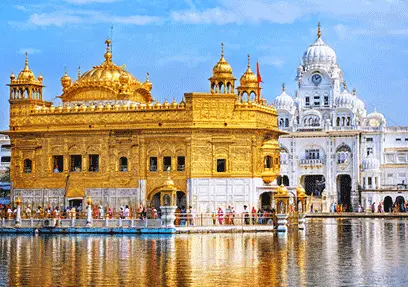Major Sikhs reside in the Indian province of Punjab. The total population of Sikhs around the world is approx 23 million.
Sikhism began in the Punjab region of the Indian subcontinent in the late 15th century. It can be understood as a religion, philosophy, as well as a way of life. The people who belong to this community are called “Sikhs”.
Gurmat means "the Way of the Guru" in Punjabi, which is the language of the Sikhs. Guru Nanak, who lived from 1469 to 1539, is said to have started Sikhism. After him, nine other Gurus led the religion. Sikhs believe that a single spirit took over the bodies of all 10 Gurus.

Guru Gobind Singh (1666–1708) was considered the tenth Guru of Sikhs. When he died, the spirit of the eternal Guru moved to the Sikhism holy book, Guru Granth Sahib ("The Granth as the Guru"), also called the Adi Granth ("First Volume"), which at the time was thought to be the one and only Guru. At the turn of the 21st century, there were close to 25 million Sikhs living in various parts of the world. Most of them lived in the Indian state of Punjab.
In Sikhism, how a person feels about religion on the inside is the most important thing.
The tenth Sikh Guru said that after he died, the teachings in that book would be the Sikhs' spiritual guide. Because of this, the Guru Granth Sahib is now considered a Guru, and Sikhs treat it with the same respect they would give a real Guru.
The Khalsa is a group of men and women who have been brought into the Sikh faith. In 1999, the Khalsa marked its 300th birthday.
“Guru Gobind Singh quoted that when the Guru Granth Sahib didn't have the answer, Sikhs should make decisions as a group based on the teachings of their scripture”.
Sikh means "learner" in Punjabi, and people who joined the Sikh community, called Panth ("Path"), were looking for spiritual guidance.
Sikhs say their religion has never been the same as Hinduism. But many Western scholars say that Sikhism began as a movement within Hinduism. They point out that Nanak was raised as a Hindu and later joined the Sant tradition of northern India, which is linked to the great poet and mystic Kabir (1440–1518).
Most Sants were poor, didn't have much, and couldn't read or write, but they wrote beautiful hymns about how they saw the divine in everything. Their tradition was heavily influenced by the Vaishnava bhakti, which is a Hindu devotional movement that worships the god Vishnu.
Nevertheless, there were significant distinctions between the two of them. The Sants believed, like the followers of bhakti, that devotion to God is the only way out of the cycle of rebirth that all humans are stuck in. However, unlike the followers of bhakti, the Sants said that God is NIRGUN ("without form") and not Sagun ("with form"). For the Sants, God can't come to life or be shown in a concrete way.